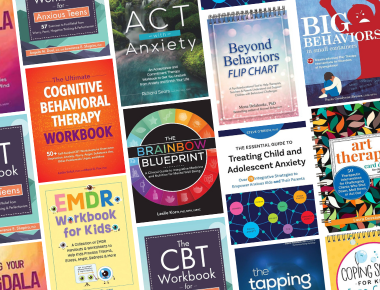12 Books for Addressing, Managing, and Overcoming Anxiety
∞≈¿÷ ”∆µ Team

Let’s face it... we all feel anxiety from time to time. But sometimes it seems like anxiety can take over our days and even our thoughts! No time of year is immune—a new school year, a busy period at work, and even the soon-to-be looming holidays—they can all cause a whirlwind of emotional and physical symptoms.
But you don‚Äôt have to remain in distress with your anxiety! ∞≈¿÷ ”∆µ‚Äôs authors know anxiety is a struggle for so many. It‚Äôs why we have so many offerings to help you feel more confident, stable, and in control of your life‚Äîand there also great options for therapists, counselors, teachers, and parents as well.
Here are ∞≈¿÷ ”∆µ‚Äôs choices for books, card decks, workbooks, and flip charts to help you tackle your clients‚Äô (or your own) anxiety:
But you don‚Äôt have to remain in distress with your anxiety! ∞≈¿÷ ”∆µ‚Äôs authors know anxiety is a struggle for so many. It‚Äôs why we have so many offerings to help you feel more confident, stable, and in control of your life‚Äîand there also great options for therapists, counselors, teachers, and parents as well.
Here are ∞≈¿÷ ”∆µ‚Äôs choices for books, card decks, workbooks, and flip charts to help you tackle your clients‚Äô (or your own) anxiety:
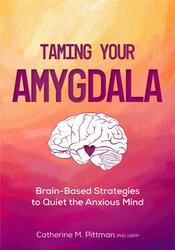
Taming Your Amygdala
Catherine Pittman
Anxiety shows up in a lot of different ways and can permeate every aspect of your life. The good news is that although it can feel confusing and overwhelming – as if things will never get better – it is possible to retrain your brain and put yourself back in the driver’s seat. Clinical psychologist Dr. Catherine Pittman offers scientific insight, clear explanations, and simple brain-based strategies to help you overcome excessive worry, anxiety, and fear.
Catherine Pittman
Anxiety shows up in a lot of different ways and can permeate every aspect of your life. The good news is that although it can feel confusing and overwhelming – as if things will never get better – it is possible to retrain your brain and put yourself back in the driver’s seat. Clinical psychologist Dr. Catherine Pittman offers scientific insight, clear explanations, and simple brain-based strategies to help you overcome excessive worry, anxiety, and fear.
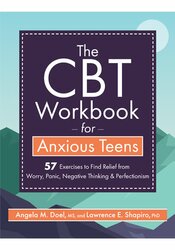
The CBT Workbook for Anxious Teens
Lawrence E. Shapiro
When emotions get in the way of a teenager’s daily life and disrupt their routine, CBT is an effective and developmentally appropriate treatment for a wide range of anxiety symptoms. The simple and practical worksheets in this workbook will help teen clients develop confidence and empower themselves to manage their distress and anxious thoughts in healthier ways as they move toward adulthood.
Lawrence E. Shapiro
When emotions get in the way of a teenager’s daily life and disrupt their routine, CBT is an effective and developmentally appropriate treatment for a wide range of anxiety symptoms. The simple and practical worksheets in this workbook will help teen clients develop confidence and empower themselves to manage their distress and anxious thoughts in healthier ways as they move toward adulthood.
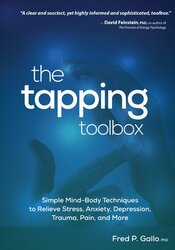
The Tapping Toolbox
Fred P. Gallo
Sometimes the key to feeling better is knowing where to tap. Rooted within energy psychology, tapping is a mind-body technique used to treat a range of psychological, interpersonal, and physical health problems, from chronic pain and anxiety to athletic performance and addictive cravings.
Fred P. Gallo
Sometimes the key to feeling better is knowing where to tap. Rooted within energy psychology, tapping is a mind-body technique used to treat a range of psychological, interpersonal, and physical health problems, from chronic pain and anxiety to athletic performance and addictive cravings.
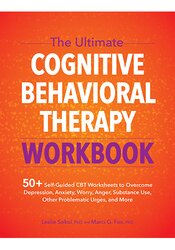
The Ultimate Cognitive Behavioral Therapy Workbook
Leslie Sokol and Marci Fox
Grounded within the basic principles of CBT, this is your go-to resource for taking healing into your own hands. Filled with over 50 practical exercises and worksheets, it will help you restructure your thinking, face your anxious thoughts, curb your anger, resist unhelpful urges, and grow the most positive and accurate view of yourself.
Leslie Sokol and Marci Fox
Grounded within the basic principles of CBT, this is your go-to resource for taking healing into your own hands. Filled with over 50 practical exercises and worksheets, it will help you restructure your thinking, face your anxious thoughts, curb your anger, resist unhelpful urges, and grow the most positive and accurate view of yourself.
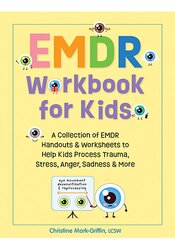
EMDR Workbook for Kids
Christine Mark-Griffin
Christine Mark-Griffin quickly realized that traditional therapy was often not enough to fully unravel the trauma and pain her young clients were carrying. Inspired by their creativity and imagination, she set out to create a resource specifically designed for use with young clients. Grounded in the core components of EMDR, the tools in this workbook can address a variety of common childhood concerns.
Christine Mark-Griffin
Christine Mark-Griffin quickly realized that traditional therapy was often not enough to fully unravel the trauma and pain her young clients were carrying. Inspired by their creativity and imagination, she set out to create a resource specifically designed for use with young clients. Grounded in the core components of EMDR, the tools in this workbook can address a variety of common childhood concerns.
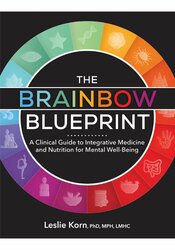
The Brainbow Blueprint
Leslie Korn
This book is the first of its kind to combine the fields of psychotherapy, somatics, nutrition, biology, herbal medicine, and spirituality to address the needs of the whole person. The methods in this book harmonize and overlap with each other – focusing on integration – to help clients get in touch with themselves so they can better manage symptoms of depression, anxiety, OCD, insomnia, chronic pain, substance use disorder, digestive issues, and more.
Leslie Korn
This book is the first of its kind to combine the fields of psychotherapy, somatics, nutrition, biology, herbal medicine, and spirituality to address the needs of the whole person. The methods in this book harmonize and overlap with each other – focusing on integration – to help clients get in touch with themselves so they can better manage symptoms of depression, anxiety, OCD, insomnia, chronic pain, substance use disorder, digestive issues, and more.
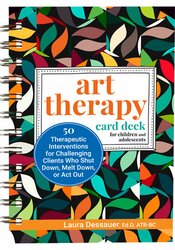
Art Therapy Card Deck for Children and Adolescents
Laura Dessauer
When words alone aren’t enough, these activities will help your young clients explore mastery, self-concept, and self-worth through art. This book features 50 creative, hands-on interventions to help kids work through difficult emotions, develop a growth mindset, and strengthen their communication skills so they can reach their goals.
Laura Dessauer
When words alone aren’t enough, these activities will help your young clients explore mastery, self-concept, and self-worth through art. This book features 50 creative, hands-on interventions to help kids work through difficult emotions, develop a growth mindset, and strengthen their communication skills so they can reach their goals.
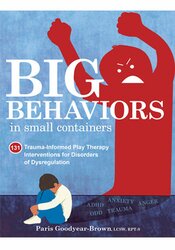
Big Behaviors in Small Containers
Paris Goodyear-Brown
Whether you’re a therapist, teacher, doctor, caregiver, or trusted grown-up in a child’s life, the tools inside will allow you to become the co-regulating, nurturing, and consistent presence that your “small container” needs to remain grounded in the face of stress, big feelings, and difficult situations. You’ll find 131 practical, fun, and ready-to-use play therapy interventions that shift the paradigm around problematic behaviors to allow for therapeutic growth and healing.
Paris Goodyear-Brown
Whether you’re a therapist, teacher, doctor, caregiver, or trusted grown-up in a child’s life, the tools inside will allow you to become the co-regulating, nurturing, and consistent presence that your “small container” needs to remain grounded in the face of stress, big feelings, and difficult situations. You’ll find 131 practical, fun, and ready-to-use play therapy interventions that shift the paradigm around problematic behaviors to allow for therapeutic growth and healing.
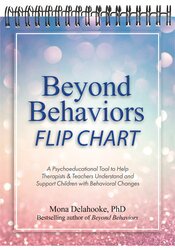
Beyond Behaviors Flip Chart
Mona Delahooke
In the Beyond Behaviors Flip Chart, therapists, teachers, and childhood providers will discover a new way to approach children’s behavioral challenges. Instead of using reinforcement schedules, sticker charts, time-outs, and other such practices to address problem behaviors, this chart introduces cutting-edge techniques that are compassionate and neuroscience-based to support children dealing with behavioral challenges, childhood anxiety, attachment difficulties, and much more!
Mona Delahooke
In the Beyond Behaviors Flip Chart, therapists, teachers, and childhood providers will discover a new way to approach children’s behavioral challenges. Instead of using reinforcement schedules, sticker charts, time-outs, and other such practices to address problem behaviors, this chart introduces cutting-edge techniques that are compassionate and neuroscience-based to support children dealing with behavioral challenges, childhood anxiety, attachment difficulties, and much more!

Coping Skills for Kids Flip Chart
Janine Halloran
Looking for fun, hands-on way to teach kids about coping skills? This colorful, interactive tool helps kids explore their coping style and learn to handle stress in safe and healthy ways. Fully illustrated with a variety of kid-friendly designs, this psychoeducational in-session tool turns learning into a dynamic and engaging skill-building experience.
Janine Halloran
Looking for fun, hands-on way to teach kids about coping skills? This colorful, interactive tool helps kids explore their coping style and learn to handle stress in safe and healthy ways. Fully illustrated with a variety of kid-friendly designs, this psychoeducational in-session tool turns learning into a dynamic and engaging skill-building experience.
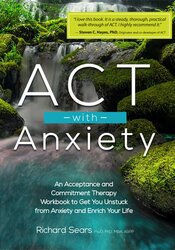
ACT With Anxiety
Richard Sears
Anxiety, in all its various forms, is one of the most common mental health challenges today. Although many of us attempt to deal with anxiety by pushing it away or trying to avoid it altogether, this often has the paradoxical effect of making it worse. Richard Sears provides detailed explanations, case examples, and practical worksheets to show you how to work with your anxiety instead of trying to battle against it.
Richard Sears
Anxiety, in all its various forms, is one of the most common mental health challenges today. Although many of us attempt to deal with anxiety by pushing it away or trying to avoid it altogether, this often has the paradoxical effect of making it worse. Richard Sears provides detailed explanations, case examples, and practical worksheets to show you how to work with your anxiety instead of trying to battle against it.
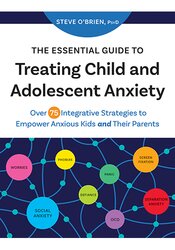
The Essential Guide to Treating Child and Adolescent Anxiety
Steve O'Brien
Clinicians will find an integrative, whole-family approach for treating the most common anxiety-related issues in childhood, including school fears, social anxiety, excessive worry, separation anxiety, and more. This book provides over 75 handouts, worksheets, scripts, and tips to help you navigate the most common treatment obstacles so you can empower anxious children and their parents to live healthier, happier lives.
Steve O'Brien
Clinicians will find an integrative, whole-family approach for treating the most common anxiety-related issues in childhood, including school fears, social anxiety, excessive worry, separation anxiety, and more. This book provides over 75 handouts, worksheets, scripts, and tips to help you navigate the most common treatment obstacles so you can empower anxious children and their parents to live healthier, happier lives.



